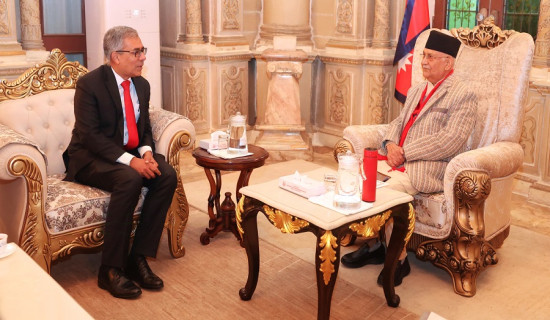- Friday, 20 December 2024
A Modern Social Awareness Novel
The word ‘Punsaban’ may be unheard these days. But, if we try to understand its meaning attentively, the word surprisingly makes everyone inquisitive about one of the important visions of Vedic life. Let’s quote Rohini Prasad Ghimire’s brief comment for the novel entitled “Punsaban” penned by Kapil Kafle, where he says “Punsaban” is that ritual through which married couples can have babies of their wish safely and scientifically.
The question, however, is: Is all this process in practice now? Senior journalist and author Kapil Kafle does not only speak pragmatically about it but also weaves themes to produce an interesting novel with the theme Punsaban. Is it relevant? Has novelist Kafle not touched on issues like women’s rights, gender exploitations, and other complex matters related to women while writing this novel, the story would have been just theoretical. But in Punsaban, the author has mixed so many themes and issues of our contemporary life, like malpractices in the name of surrogacy, attempts to victimise women with mobilisation of illegal funds, bribery, political aberrations, and economic distortion. The result of all these features is that the novel has become a mirror-like story to watch our contemporary life and society.
The starting pages of the novel, however, share some romantic themes with open talks on gender issues at an interaction program in the beautiful city of Pokhara. But ultimately, both the love theme and the place of stories of the novel shift to the portrayal of the social theme of the capital, Kathmandu, itself. The novelist mentions the fourth chapter’s 205 Slokas of Manu Grantha, which clearly prohibits Brahmans even from taking food at Yagna conducted by impotent persons. To this instruction, the reaction is sharp from the participants at an interaction gathering. They Protest: ‘Don’t call Napunsak (impotent). This is an abusive word. We don’t tolerate such insults. We boycott this interaction.’
So, what can be said is this novel, on the one hand, seeks healthy debate on gender issues, and on the other, it extensively drags problems of society into discussions with an aim to foster true values of modernity and development aspirations of the country.
If we take novelist Kafle’s point of view about this publication, this novel is written with the idea that he felt during his literature review for his PhD thesis entitled ‘Gender Representation in Hindu Culture and the Role of Media.’ Thus, it is a study-based novel.
Even so, only study and quotes of authentic books do not make a good novel. Authors must be imaginative, and they should pursue norms of art for stories. Here “Punsabana” author has a proven record of literary writings. The books like the story “Aek Sansadko Antya,” “Chitragupta” (humour-satire), “Baghpash” (novel), and “Susam Chandika” (novel), which are published to his credit already, need to be remembered here.
This time while publishing Punsaban, Kafle has been praised through the preface titles ‘Waves Are Expected’ by Prof. Krishna Gautam and ‘A Novel Full of Social Message’ by Dr. Gyanu Pandey. This all means, despite the ritualistic title, the Punsaban holds themes of modern times. In fact, the curiosity about how we should view rituals like “Punsaban” is discussed in this novel in detail.
No doubt, a novelist develops characters and tells stories of society. In “Punsaban,” too, we have various characters like Maya, Manuraj, Jesika, Pratima, Shova, and Mina, and in the villain’s role, Jaydrath. The story is attractively described through the character Chapalendra Swami, who practically explains the practice of “Punsaban” to make the aim to give birth to desired babies—sons or daughters—interesting. Author Kafle writes while telling this story—cording to the oriental vision mentioned in Nirdaya Sindhu written by Kamalakar Bhatta, this method is simple, understandable, and practicable. All we need to do is to understand the letters of Vedic Shastras and practice the vision of our ancient sages for this purpose.
Thus, to see “Punsaban” in a broader canvas, the novelist is keen to connect myriads of themes of the nation, too. He writes responsibly and categorically shows changes and challenges of new times. Has the nation been able to contain troubles of public life in the new democratic system?
Novelist Kafle is an experienced journalist and knows what still ails the nation. The emergence of character Jaydrath in the novel exposes the fact that many things are still lacking in the delivery of good governance.
So, “Punsaban” by Kapil Kafle is a fresh Nepali novel with social awareness value. As a skilful story author, he sometimes has romantically woven stories in it, and sometimes he makes readers serious about social aberrations of our free society.
In conclusion, it is a delightful novel because it has quite interestingly highlighted our ancient values of “Punsaban” and cautioned all not to fall prey to the vices of free society because freedom is meant to do good for the nation and society.
(Kafle is a former Deputy Executive Editor of this daily.)
















